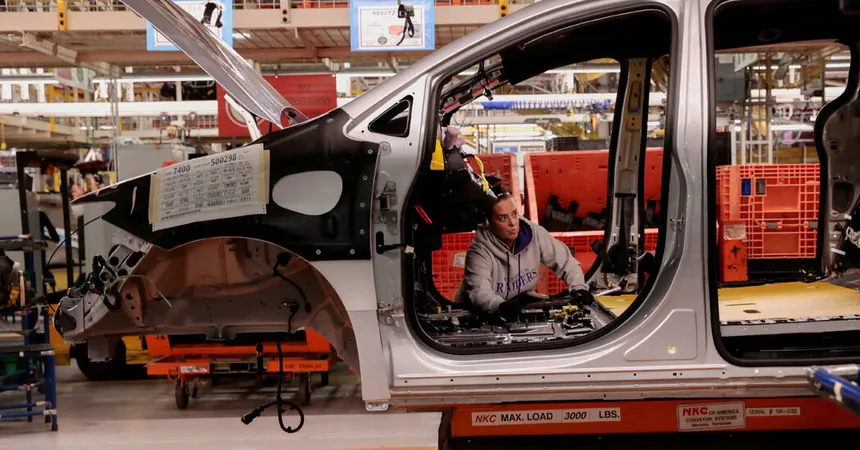
Trump's Tariffs: A Looming Crisis for the Auto Industry?
2024-11-26
Author: Ming
Introduction
As President-elect Donald J. Trump threatens to impose a staggering 25% tariff on goods imported from Mexico and Canada, concerns are mounting within the auto industry, a sector heavily reliant on parts and manufacturing from these neighboring countries. Industry experts are calling this potential tariff a 'two-alarm fire' that could reverberate across assembly plants in key states such as Michigan, Ohio, Illinois, and Texas.
Impact on Auto Prices and Economy
The impact of these tariffs could be catastrophic; popular vehicles like Ram pickups from Stellantis and Chevrolet Silverados from General Motors, which are manufactured in Mexico, would skyrocket in price. Economists predict that rising auto prices could trigger increased inflation and lead to decreased sales and potential layoffs, further challenging an already struggling industry.
Defending the Tariffs
A spokesperson for the Trump-Vance Transition defended the president-elect's position, pointing to past tariffs on China that purportedly boosted American jobs and investment without causing inflation. They asserted that Trump aims to revive U.S. jobs by raising wages, lowering taxes, and cutting regulations.
Industry Challenges
However, the auto industry is facing unprecedented challenges, including declining consumer demand and a shift toward electric and hybrid vehicles. Major automotive players like Nissan and Volkswagen are already feeling the strain, with Nissan announcing layoffs of 9,000 employees globally and speculation about closed plants in Europe.
Investment in Electric Vehicles
Trump's tariffs pose a significant threat at a critical time. Automobile manufacturers have invested billions in electric vehicle infrastructure, particularly following the Biden administration's subsidies, which could be at risk under Trump's proposed policies. A sudden shift away from these subsidies could destabilize the market, leaving companies like General Motors in a precarious position regarding their electric vehicle production plans.
Supply Chain Interconnections
The deep interconnections between U.S., Canadian, and Mexican factories were starkly highlighted during the pandemic, when a blockade by truck drivers in Canada briefly halted production on this side of the border. As Erik Gordon, a professor at the University of Michigan, highlighted, the proximity of Southern Ontario to Detroit makes it integral to supply chain dynamics—similar to imposing a tax on essential goods flowing into a major city like New York.
Broader Economic Implications
Furthermore, Trump's threats, framed as an effort to combat illegal immigration and drug trafficking, may inadvertently lead to increased migration from Mexico if significant job losses occur as a result of tariffs. Economists warn of the potential for broader economic implications, with Anna Nagurney from UMass Amherst emphasizing that declining job stability can lead to ripple effects throughout society.
Global Manufacturing Landscape
In a more global context, tariffs could shift Mexico's manufacturing landscape closer to Chinese carmakers like BYD and Geely, who are already making significant strides in the region. While potential factory plans among these companies are currently on hold pending Trump's decisions, their presence represents a growing challenge to the traditional dominance of American and Japanese automakers.
Market Reactions
The financial markets reacted swiftly to these tariff proposals, with General Motors' stock plummeting nearly 9% shortly after Trump's announcement, along with notable declines for Stellantis and Ford. Ford expressed less vulnerability, citing the company's focus on American manufacturing.
Conclusion
While automakers are tight-lipped regarding their strategies in light of the potential tariffs, industry experts suggest that these threats could ultimately serve as leverage in negotiations rather than actual policy enactments. Richard Baldwin, an economist, noted that the threat alone may compel negotiations and concessions from both Canada and Mexico ahead of any formal discussions.
Final Thoughts
As the automotive industry braces for what could be a tumultuous future, the looming specter of tariffs continues to captivate attention, prompting questions about economic resilience and the complex tapestry of North American trade relations.

 Brasil (PT)
Brasil (PT)
 Canada (EN)
Canada (EN)
 Chile (ES)
Chile (ES)
 España (ES)
España (ES)
 France (FR)
France (FR)
 Hong Kong (EN)
Hong Kong (EN)
 Italia (IT)
Italia (IT)
 日本 (JA)
日本 (JA)
 Magyarország (HU)
Magyarország (HU)
 Norge (NO)
Norge (NO)
 Polska (PL)
Polska (PL)
 Schweiz (DE)
Schweiz (DE)
 Singapore (EN)
Singapore (EN)
 Sverige (SV)
Sverige (SV)
 Suomi (FI)
Suomi (FI)
 Türkiye (TR)
Türkiye (TR)